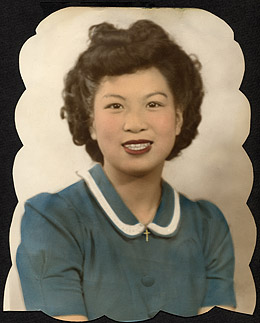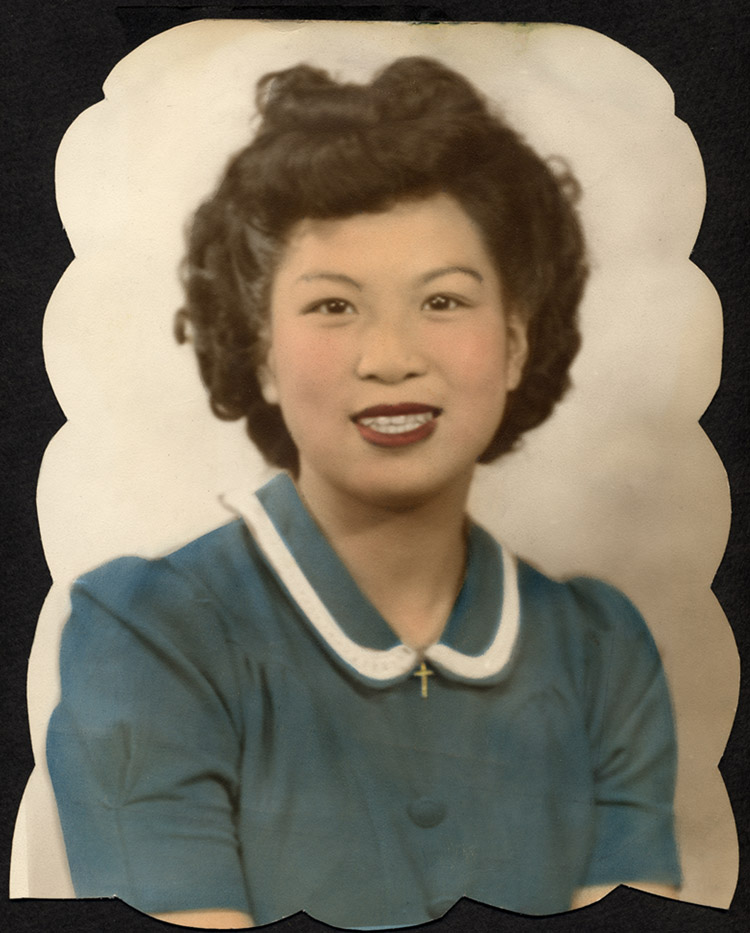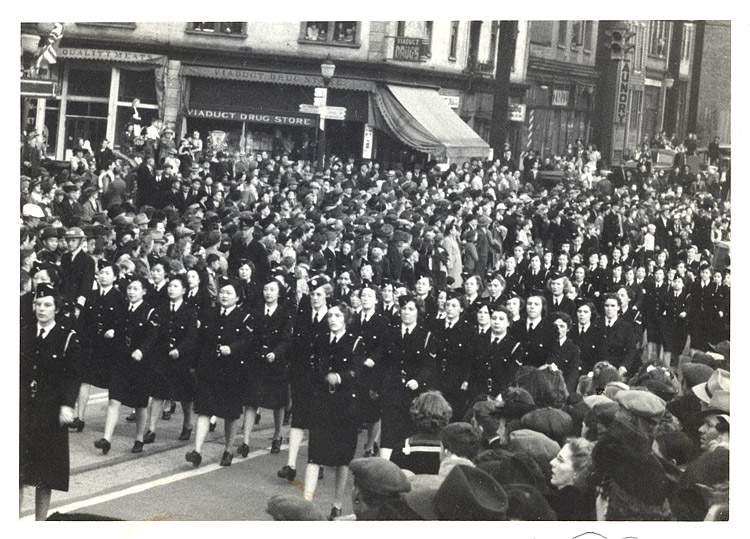Peggy Lee
Peggy Lee actively served on the home front before her flourishing career as a businesswoman and community activist. « View Transcript
Peggy Lee (Interviewee)
Well, my father came from Canton province, and he came over here and laid the railroad. I know. I think it was in the early 1900s or late 1800s; and the railroad ended in Prince Rupert. It never went any further. And because of that, he started a store and that's how we landed in Prince Rupert, and that's where we lived most of our life.
Wesley Lowe (Interviewer)
You might think that Peggy Lee, growing up in the fishing village of Prince Rupert, would be safe from the concerns of war. However, even here, the tentacles of fear and suspicion reached far even to your neighbours.
Peggy
I worked for a grocery store, you know, like the wholesaler, after work or before when I stopped school. We all went to the same school you know, Japanese all alike. I used to go to school with this Japanese girl named Emily and her brother... Tamanaka, I think. Yamanaka. They had a grocery store, and he use to come over and the only thing I ever felt was that he would be so. at that time, the Japanese was taking over China, remember? And he used to come and fight with my boss all the time. And he use to say to me, "Japan don't want to fight with China. We want to be their big brother." I said, "You're little land want to be big brother to China? You know?" Remember the ships they brought along the coast? The Japanese? They were here for war.
Why would they have those three ships come down there? They were charting our coastline in order to invade us. That's why they sent the Japanese into all the... out of the. the . B.C., remember? Or out of the coastline; and they had a reason for that.
Wesley
What did you do during World War Two?
Peggy
War started in Prince Rupert already. We entertained some of the soldiers. I couldn't, couldn't read a bit of Chinese, but I followed the song, you know? And I got all the little people and we. at the church and we use to entertain the soldiers.
. And in the end of 1939 or 40, I came to Vancouver. And then, then one day, Dr. Chu's sister, Peggy . "They're gonna [sic] form a St. John's Ambulance Corps, you know, for women? Would you like to come?" And I said, "Oh, yes. I like to do what I can, too." You know, at that that time, Dr. Gung, Dr. Chu and Dr. Yip, they were the only three physicians in Vancouver or B.C. at that time, practicing amongst the Chinese, you know; and they were all very good. They volunteered their work. We had quite a nice platoon. You know too at that time I was doing hair for all these war workers at North Vancouver. They used to come in late, and we're not allowed to open late, but they allowed me to... to do them. You know, Rosie the Riveter. that are all. that's. in a way, that's when women found their place at going out to work. But anyway, getting back to the St. John's Ambulance Corps, it was very, very. I was so glad to be in it. We learned how to march.
We took up... I took up S.O.S., never finished it, and I took up firefighting and sliding down (chuckles); it was... anyway, it was kinda [sic] enjoyable, too. Then I became . we took the course in St. John's Ambulance Corps and we took up home nursing. I got the certificate and then I was also a stretcher-bearer. The day that we sent the boys overseas. it was down on Hastings Street, and all those boys that you see in the Muse, I know them all. They were. you know, older than I was - one or two years, but not much. And then, I got involved in the canteen in Burrard Street. That's where I learned to wash dishes, make soda, dance with the. the... the soldiers; and I did all those things and it was a good experience for me because it made me part of something; and we marched in every parade you can think of. We can sunrise services, starting at five o'clock in the morning. We went to all of the. most of our drilling was down at the Seaforth Armoury. You know Seaforth Armoury?
We were going to do all the things, like if we had an air raid. We learned how to deliver a baby. We learned all the things to do incase we had a war, also marched in Chinatown for the blackout. You know, we had to check all the people to make sure everything was blacked out. We did all the things that we would do normally in a war so that we could ease the people to do the other part.
Wesley
So you were being prepared just in case Canada was being invaded?
Peggy
Yes, yes. They never said. Just in case. They never said anything about sending us overseas or anything, but we were the first Chinese platoon. That was remarkable.
Wesley
The Women's Ambulance Corps was an all. all Oriental, all Chinese women.
Peggy
That's why we were so unique - all Chinese women.
Wesley
How did you find out the war ended? What was your reaction?
Peggy
Oh, we were happy. We were all on the streets and everything.
Wesley
How did you find out?
Peggy
Well, it came over the news. I knew all the newspaper people, you know, and they all. you know... we were all just ecstatic. I remember all the ribbons, just like New York; all the ribbons coming down and we were all marching and I had this little friend from Prince Rupert down with me and we were marching up and down the street. We were just, just very, very happy. But mainly, it was so nice that the boys were coming back, you know? That was really good.
Wesley
Do you consider yourself to be Canadian or Chinese-Canadian?
Peggy
I'm proud to be a Canadian and the Chinese part come with my heritage. I am a Canadian first and proud to be part of Canada and I'll do anything for Canadian. You know that?
Did you Know?
Did you know that Peggy Lee was the youngest person in the Women's Ambulance Corps?
Table of Contents
- John Ko Bong member of Operation Oblivion
- Mary Ko Bong an instrument mechanic
- Neill Chan deciphered communications
- Paul Chan served in the Second World War
- Roy Chan served in the Second World War
- Bill Chong served as Agent 50...
- George Chow trained as a gunner
- Marshall Chow a wireless operator
- Douglas Jung represented CA at UN
- Daniel Lee an aircraft mechanic
- Peggy Lee served in the home front
- Alex Louie trained in India to parachute
- Albert Mah flew 420 return trips from...
- Cedric Mah a pioneering bush pilot
- Roy Mah a pillar of the community
- Gordie Quan full military career
- Andrew Wong in US Merchant Marines
- Frank Wong in Holland for the liberation
- Henry Albert (Hank) Wong
- Larry Wong in Newfoundland Regiment
- Mary Laura Wong (Mah) a teletype operator
- Date modified:


